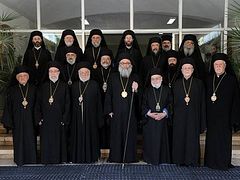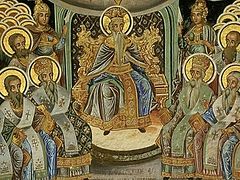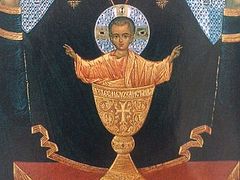Metropolitan Gabriel of Lovech explained to the site Dobrotolyubie (Philokalia) why the Holy Synod of the Bulgarian Orthodox Church has decided not to participate in the Holy and Great Council of the Orthodox Church in Crete if it won’t be postponed.
—Your Eminence, in these days after the decision of the Holy Synod of the Bulgarian Orthodox Church, the media has circulated the opinions of such theologians as Kalin Yanakiev and Dilian Nikolchev, according to whom this decision was “radical” and “not proper,” because it could have been decided already a year ago, and not in the last moment. Is it true that the themes of the Council were chosen in January of this year, but the arrangement of the participants and observers and other details in connection with the Council were determined and became known just two weeks ago?
—I wouldn’t say that it’s not proper. What’s not proper is that they invited us to a Council where everything has already been predetermined. Yes, and actually, until now—until the last moment—we hadn’t decided whether to go to the Council or not. But now, in any case, the truth is clear. Of course, we didn’t find out about this just now, however to make up our minds… We didn’t do it right away.
There are specific questions, which this Council, convened not so often, should also tackle (besides those included in the agenda). For example, the question about the calendar. Can the Orthodox Church continue to serve on both calendar styles? If this question isn’t resolved now at the Council, then when will it ever be resolved? In 1948 at a pre-conciliar conference in Moscow it was said concerning the calendar that any Local Orthodox Church can serve on the new or the old (although the Paschalia should be the same for both), but at the next Pan-Orthodox Council, whenever it were to be convened, the style should be unified. And now, the Council is being convened. Can we, for example, not resolve this question? When will it be worked out? It is not normal that we have two styles.
There are also other questions that should be resolved at the Council. Actually, we knew about this earlier; we didn’t find out about it just now in the last moment. And further, we’ve made a decision about one of the documents (although in others there may also be criticisms)—“Relations of the Orthodox Church with the Rest of the Christian World,” in which there is much that is completely erroneous and un-Orthodox.
We could go to the Council, but according to the accepted Conciliar regulations no amendments will be accepted there.
This is because the regulations are such that first a commission must decide whether to introduce what we want as a question for the vote of the Council, and even if it’s accepted, if the Council doesn’t unanimously vote upon it, it means it cannot be changed.
And what does that mean? It means that some document is accepted by commission, but these commissions are not the Council. The regulations were also not voted upon by Council, but the patriarchs, and they also are not the Council. And in the end it will be impossible to introduce any amendments to this document, or to any other either, because not even in one instance will every Church vote unanimously in favor, but there will be those who are against.
This means that we would be going to a Council where the decisions are already predetermined.
And why is this not taken into consideration? It’s a Council; it’s serious work!
How often are councils convened? Sometimes hundreds or even thousands of years pass by. A council should resolve those questions that are truly important for Orthodoxy.
And now we have made such a decision [not to go]. We could have done so earlier, but it wasn’t easy. Some even say that it took great courage to make such a decision… You can see that there is no other Church that did this besides us.1
So our Synod effectively decided this. I, personally, when I went to the meeting, didn’t know that we were going to make such a decision.
But of one thing I was sure—that we needed to ask to postpone the Council in order to work out these questions so that the Council could truly have a great effect.
For me the Council as such should be in a condition to work out the regulations of its session, in order to be voted upon, as everywhere: when the Bulgarian Parliament forms a new national assembly, no one gives them a prepared agenda—they create their own rules for themselves. The Council should decide this. Now it’s been decided by the patriarchs. Okay, but all the patriarchs are not the Council—the Council has a much broader representation.
Everything was defined beforehand, and therefore we decided that it would be good for the Council to be postponed, so that the controversial questions could be settled. Our desire is that everything pertaining to Orthodoxy would be truly resolved in the best way. So it’s not important that we decided this in the last moment. Yes, we already knew about these things.
And in terms of the seating arrangements in the hall—it’s the least of the problems. It’s the least of the problems!
About the large costs, about which we wrote—if the Council would actually resolve any really serious questions, then we would give such a sum to go, but now we’re going to a Council where everything is already predetermined, and to give more than half a million leva2… For the Bulgarian Orthodox Church that’s a lot of money. We would give it if we knew the event would be worth it. You know, we don’t even know how much money it will take. No one has told us definitively how much it will cost, but it will be more than half a million—and who knows how much more it will cost? Is such a sum possible now? They should tell us. Let them tell us. Yes, we really made such a decision.
—But in fact our metropolitans have regularly taken part in these pre-conciliar conferences where they discussed the themes to be examined at the Council, as well as the content of the pre-conciliar documents. Why didn’t our metropolitans speak out against these documents then, but only now, when the documents are already signed?
—Because when someone wanted to introduce changes, those who lead the meetings of the commission said: “We don’t have regulations for introducing these changes, as we were told at the Synaxis of the Patriarchs, we are to make only small changes.” And since if someone at these commissions doesn’t sign the decisions then those decisions vanish, they [the metropolitans] signed, but there was hope that these things could be re-examined at the Council. In the end, regulations were adopted by the Synaxis, which—as I’ve already told you—don’t allow the introduction of any kind of amendments at the Council.
In the final result it came out that whatever was adopted by the commission as a compromise will be impossible to change at the Council.
That’s what the members of the commission didn’t know. They thought: “Okay, we’ll sign for the sake of this or that, so that none of the meetings of the commission will fail, because after all there will be the Council”—but it turns out that what was accepted by the commission is, in essence, impossible to change at the Council. It’s true. Read about it. Whoever wants to, let him read it. It’s true.
—Is there a political undertone to the reaction of the Holy Synod? Because at the moment the Church is again accused of practically serving some Russian interest and again supporting the Russian Church.
—Why are they lying? Why are they lying? Why didn’t anyone say: the Russian Church, at the Council of Bishops that took place at the beginning of February, accepted every document, without comment? I think, maybe four people were against it. On April 22 the Bulgarian Church didn’t accept one of the documents, the most contested. Who were we listening to then? The Russian Church? Then we would have done the same! We proceeded according to our conscience. Can we really ignore it? They’re purposefully writing incorrectly… And the site Dveri.bg wrote: “Russian politics.” Why didn’t they write earlier that what we decided then was in essence against, not in unison with, not in agreement with the Russian decision? How did we accept it then? This is very important!
We’re against one document, which, in fact, is maybe quite important for the Council. We can say that now we stand closer to the Greek position, because the Greek Church also didn’t accept this document. But the Russian Church accepted it—they haven’t as yet said that they don’t accept it. We’re also with Holy Mount Athos—they are also against this document. The Georgian Church is against this document. But the others accepted it. So which Church are we with then?
—But in fact there has appeared a letter of the Russian Patriarch to the Ecumenical Patriarch?
—The publication of this letter3 was precisely the same, with the implication of Russian influence on our decision as the messenger. The letter concerns only the arrangement of the delegations in the hall at the sessions of the Council, but our position has more serious foundations. The Ecumenical Patriarch called us already the next day about the placement of the delegations, that all has been arranged as necessary. If that had been our reason then we could go to the Council because it was already fixed the next day. We made our decision on June 1, and they called us on June 2. Our chief secretary spoke on the phone in front of everyone with the secretary of the Ecumenical Patriarch, and he said that the arrangement of the delegations was already adjusted to what the Russian and other Churches wanted.
If that had been our reason then we would go to the Council. For us it a minor, secondary reason, the most important being the first two: that there are many important topics excluded from consideration at the Council, and that we would be going to a Council where everything was already predetermined. There’s nothing for us to decide there, because changes are impossible, inasmuch as changes will not be unanimously accepted. Imagine a national assembly requiring a unanimous vote—what would they decide? Nothing. You’ll always find someone who disagrees—it would block the work of the national assembly.
There, that’s the truth. Why are they lying? They’re not stupid people. Let them consider and understand that this is the truth.
—What do we lose and what do we gain by our Church not participating in the Council?
—I can’t say. If we win then we win for all of Orthodoxy. If the Council will be postponed, then we win, because it will be better prepared—so that certain important topics would be included, and there would be some changes to the regulations, so that questions could be resolved at the Council, and not only by the commissions. And if it’s impossible to change anything at the Council then what’s the point of the Council? And there’s another point: that every bishop should be able to vote—not that every Church would have just one voice, but that it would be like every other Council. There has been no such Council until now where every Local Church had just one vote. Everyone participating should have the opportunity to express his opinion when he wants—this is also according to the rules of the Councils. That’s what we want, and nothing else. And what we would lose? I don’t know. But I know what we will win.





If Orthodoxy (The mother of all Christian churches)
is about LOVE and FORGIVENESS, then I respectfully submit that the reasons displayed above are valid reasons to participate in the Council.